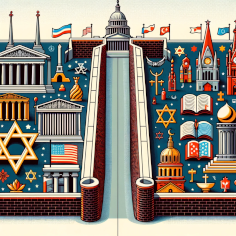The intersection of religion and politics is a complex and multifaceted subject, deeply rooted in historical contexts and evolving cultural norms. Throughout history, religion has played a significant role in shaping political systems and influencing governance.
In many societies, religious beliefs and institutions have been deeply intertwined with the state, often guiding or justifying political authority and public policy. This has been evident in various forms of government, from theocracies where religious leaders hold direct political power, to more secular states where religious values indirectly shape laws and social norms.
Table of Contents
- Thomas Jefferson and the Danbury Baptist Association
- The Government's Power Should Not Extend to Religious Beliefs
- First Amendment of the U.S. Constitution
- Religion's involvement in politics and governance
- Religion's involvement in politics and governance.
- When Religion Runs A Country
- Facts or Faith:
- Wrapping Up
Thomas Jefferson and the Danbury Baptist Association
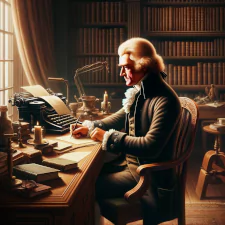
The exchange of letters between Thomas Jefferson and the Danbury Baptist Association in 1802 is a significant historical correspondence, particularly in the context of the American principle of separation of church and state.
The Danbury Baptists, a group representing twenty-six churches in western Connecticut and eastern New York, wrote to President Thomas Jefferson on October 7, 1801, expressing concerns about their religious freedoms.
The Government’s Power Should Not Extend to Religious Beliefs
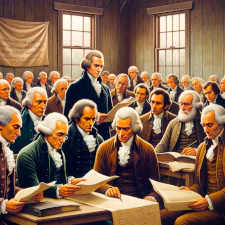
They acknowledged Jefferson’s past services and his position on religious liberty, highlighting the notion that religion should be a matter solely between a person and their God, and that the government’s power should not extend to religious beliefs.
The Baptists were apprehensive about their religious privileges being treated as favors granted by the government rather than as inalienable rights. They viewed Jefferson’s presidency with optimism, hoping his influence would promote religious freedom and counteract tyranny and hierarchy.
Jefferson responded to this letter on January 1, 1802. In his reply, he expressed his agreement with the Baptists on the matter of religious liberty, emphasizing that religion is a matter between an individual and their God.
First Amendment of the U.S. Constitution
Congress shall make no law respecting an establishment of religion, or prohibiting the free exercise thereof.
First Amendment of Constitution of the United States
He referenced the First Amendment of the U.S. Constitution, stating that the American people had declared that their legislature should make no law respecting an establishment of religion or prohibiting its free exercise.
This, he noted, effectively created a “wall of separation between Church and State.” Jefferson’s letter is known for this phrase, which has become a cornerstone in the understanding and interpretation of the First Amendment, particularly regarding the Establishment Clause.
Jefferson’s response was seen as an assurance of his commitment to protecting the rights of conscience and religious freedom, affirming his belief in the limited role of government in matters of personal faith.
This correspondence is often cited in discussions about the role of religion in the American government and the historical context of religious freedom in the United States. The letters highlight the ongoing debate and considerations around the separation of church and state in American political and social discourse.
Religion’s involvement in politics and governance
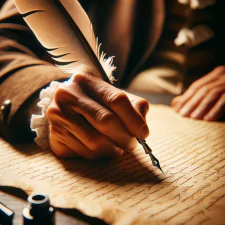
The Letter Thomas Jefferson Wrote
To messers. Nehemiah Dodge, Ephraim Robbins, & Stephen S. Nelson, a committee of the Danbury Baptist Association in the state of Connecticut.
Gentlemen
The affectionate sentiments of esteem and approbation which you are so good as to express towards me, on behalf of the Danbury Baptist association, give me the highest satisfaction. my duties dictate a faithful and zealous pursuit of the interests of my constituents, & in proportion as they are persuaded of my fidelity to those duties, the discharge of them becomes more and more pleasing.
Believing with you that religion is a matter which lies solely between Man & his God, that he owes account to none other for his faith or his worship, that the legitimate powers of government reach actions only, & not opinions, I contemplate with sovereign reverence that act of the whole American people which declared that their legislature should “make no law respecting an establishment of religion, or prohibiting the free exercise thereof,” thus building a wall of separation between Church & State.
Adhering to this expression of the supreme will of the nation on behalf of the rights of conscience, I shall see with sincere satisfaction the progress of those sentiments which tend to restore to man all his natural rights, convinced he has no natural right in opposition to his social duties.
I reciprocate your kind prayers for the protection & blessing of the common father and creator of man and tender you for yourselves & your religious association, assurances of my high respect & esteem. Thomas Jefferson Jan. 1. 1802.
Provided by the Library of Congress.
Let’s dissect the letter part by part:
Addressee:
- “To messers. Nehemiah Dodge, Ephraim Robbins, & Stephen S. Nelson, a committee of the Danbury Baptist Association in the state of Connecticut.”
- Jefferson addresses the letter to specific individuals representing a religious group, showing the formal and respectful nature of his communication.
Greeting:
- “Gentlemen”
- A formal salutation, showing respect.
Expression of Gratitude:
- “The affectionate sentiments of esteem and approbation which you are so good as to express towards me…”
- Jefferson expresses gratitude for the kind words and sentiments shared by the association, which is making him feel appreciated and satisfied.
Professional Commitment:
- “my duties dictate a faithful and zealous pursuit of the interests of my constituents…”
- Jefferson is asserting his commitment to diligently serving the interests of the people, reflecting his sense of responsibility as a public servant.
Philosophy on Religion and Government:
- “Believing with you that religion is a matter which lies solely between Man & his God…”
- Jefferson shares his belief in the individual’s personal relationship with religion, independent of governmental influence or interference.
- “…thus building a wall of separation between Church & State.”
- He references the First Amendment, emphasizing the importance of separating religious institutions from government to ensure freedom of religion.
Wishes and Assurances:
- “I reciprocate your kind prayers for the protection & blessing of the common father and creator of man…”
- Jefferson returns the kind prayers and wishes shared by the association.
- “…assurances of my high respect & esteem.”
- He concludes by reassuring his high regard and respect for the association and the individuals addressed.
Signature and Date:
- “The Jefferson Jan. 1. 1802.”
- The letter is signed and dated, giving it authenticity.
Overall Analysis:
- The letter is a thoughtful and respectful response to the Danbury Baptist Association.
- Jefferson communicates his appreciation for their sentiments, reaffirms his dedication to his duties, shares his beliefs regarding religion’s place in relation to the government, and concludes by reciprocating good wishes and assurances of respect.
- The most significant part of the letter is where Jefferson emphasizes the “wall of separation between Church and state,” a principle fundamental to the understanding of freedom of religion in the United States. This expression has played a critical role in the discourse around the First Amendment and the establishment and free exercise clauses.
Religion’s involvement in politics and governance.
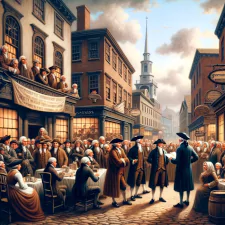
In modern times, the role of religion in politics continues to be a subject of intense debate and varies significantly across different countries and cultures. In some nations, religion remains a cornerstone of political life, directly influencing legislation and public policy.
United States Constitution’s Establishment Clause
In others, particularly those with a commitment to secularism, there is a deliberate effort to separate religion from state affairs, following principles like those outlined in the United States Constitution’s Establishment Clause.
This separation is often seen as a way to ensure freedom of religion and belief for all citizens, preventing the government from favoring or discriminating against any particular religious group. However, even in secular states, religious beliefs often continue to influence the personal values and decisions of politicians and voters, subtly shaping the political landscape.
The balance between respecting religious diversity and maintaining secular governance is a continuous challenge. The influence of religion in politics raises important questions about how best to accommodate the religious beliefs of citizens while ensuring that government remains neutral and inclusive.
When Religion Runs A Country
There are several countries in the world where religion plays a significant, often central, role in governance. Here are a few examples:
- Vatican City: Perhaps the most prominent example of a religiously governed state, Vatican City is an ecclesiastical state, ruled by the Pope, the leader of the Roman Catholic Church. It is the spiritual and administrative center of the Church and serves as the residence of the Pope.
- Iran: Iran is a notable example of a theocratic republic. After the 1979 Islamic Revolution, the country adopted a constitution based on Islamic law (Sharia) and political theory. The Supreme Leader of Iran, a position currently held by an Islamic cleric, holds significant influence over all major state decisions.
- Saudi Arabia: Saudi Arabia is an Islamic monarchy where the Quran and the Sunnah (traditions of the Prophet Muhammad) are considered the constitution. The country is governed based on strict interpretations of Islamic law, and the King’s power is limited in the context of adherence to Sharia.
- Israel: Israel defines itself as a Jewish state. While it has a parliamentary democracy, the Jewish character of the state influences several aspects of its governance and law. For example, Jewish religious law plays a role in certain personal status issues like marriage and divorce.
These examples illustrate the diverse ways in which religion has integrated into the governmental structures and legal systems of different countries, ranging from direct theocratic rule to more symbolic or constitutional roles.
Facts or Faith:
Poses several challenges to the principles of democracy for various reasons. Here are some arguments outlining why mingling religion with politics and governance could be potentially problematic:
Threat to Secularism:
- Democracies generally thrive on secularism, where the state maintains a neutral stance towards all religions. When religion influences politics and governance, it could jeopardize this neutrality, potentially favoring one religion over another, thus undermining secular principles.
Impairment of Objectivity:
- Decisions in governance should be made based on rational deliberation and the welfare of all citizens. Religious involvement might lead to decisions being influenced more by religious doctrines rather than an objective assessment of what is best for society as a whole.
Risk of Discrimination:
- Different religions have diverse beliefs, practices, and values. Governing with strong religious influences could lead to laws and policies that are discriminatory towards certain groups, whether they belong to other religions or no religion at all.
Restrictions on Freedoms:
- Democracy values individual freedoms, including freedom of belief. An intertwining of religion and politics might impose certain religious beliefs or practices on citizens, restricting their freedom to choose and practice their own beliefs.
Conflicts and Divisions:
- Religion in politics can exacerbate societal divisions. It can convert political debates into religious conflicts, making compromise more difficult and leading to increased tensions and polarizations within society.
Challenge to Pluralism:
- A healthy democracy respects and promotes pluralism. However, religious involvement in governance may challenge this, as policies might be inclined to favor a certain religious perspective, hindering the ability to accommodate diverse viewpoints.
Manipulation and Exploitation:
- Politicians might exploit religious sentiments for electoral gains, manipulating people’s beliefs and sentiments for political ends. This exploitation can harm the integrity of democratic processes.
Impact on Scientific and Social Progress:
- Religiously influenced governance might resist certain scientific advancements or social reforms due to religious doctrines. This resistance can hinder societal progress and innovation.
Wrapping Up
While religion can offer moral and ethical guidance, its over-involvement in politics and governance can pose substantial risks to democratic principles and processes. Religion has no place in government. Thomas Jefferson said it best the separation of religion from politics, often referred to as the “separation of church and state,” can help in maintaining a balanced and inclusive democratic society that respects and values diversity and individual freedoms.
The examples of Vatican City, Iran, Saudi Arabia, and Israel demonstrate the varied manifestations of religion in governance across the globe. From the ecclesiastical authority of the Pope in Vatican City to the theocratic leadership of Iran; to the integration of religious principles in Saudi Arabia’s legal system.
To the Jewish identity influencing Israel’s political and social fabric, these countries illustrate the profound and diverse impact religion can have on political structures. As we have seen that does not mean religious applications in running governments always work. All we need to do is look at third-world countries for examples of the failures of state-run religions.
Each represents a unique blend of religious tradition and governance, highlighting the complex interplay between faith and statecraft. This diversity underscores the ongoing global dialogue about the role of religion in public life and governance, reflecting a spectrum of approaches to reconciling religious beliefs with the demands and principles of modern statehood.

